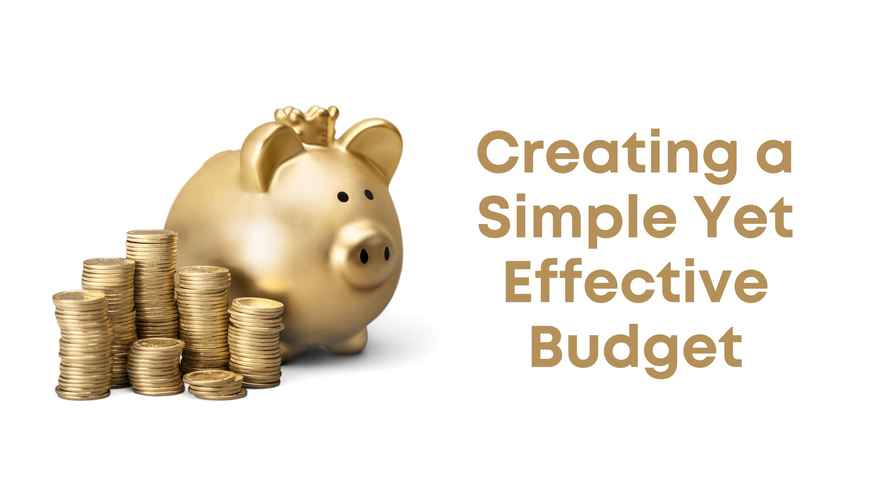A Step-by-Step Guide to Creating a Simple Yet Effective Budget

Budgeting stands as a cornerstone of financial health and independence. Yet, despite its significance, creating a budget often evokes feelings of constraint rather than empowerment.
However, when approached with the right mindset and strategy, budgeting can liberate you from financial stress, allowing you to make informed decisions that align with your goals.
This budgeting guide demystifies the budgeting process, offering a step-by-step approach to developing a simple yet effective budget that works for you.
Understanding the Purpose of Budgeting
Before diving into the numbers, it's crucial to understand that a budget is not about restricting your lifestyle but empowering you to live the life you desire within your means. It's a tool for clarifying your financial situation, setting achievable goals, and laying the groundwork for future prosperity.
Step 1: Assess Your Income
The foundational step of any budgeting process is accurately determining your total monthly income. This involves a comprehensive assessment of all reliable sources of income to ensure your budget is built on a solid and realistic financial footing. Here's how to refine this critical first step:
1. Compile All Sources of Income: List every regular income source. This includes your primary job's net salary (after taxes and deductions) and secondary sources like part-time jobs, freelance work, rental income, or business revenues. Remember, consistency is key, so only include income you can count on month after month.
2. Account for Variable Income Wisely: If your income includes variable components, such as commissions, bonuses, or fluctuating freelance earnings, calculate an average based on the past six to twelve months. This approach gives you a more stable base for your budget, minimizing the risk of overestimating your available funds.
3. Consider Non-Monetary Benefits: Pay attention to non-monetary income that affects your monthly budget. For example, if your employer offers a stipend for health insurance or a monthly transportation pass, these benefits have real financial value and should be factored into your total income.
4. Use Tools for Accuracy: Leverage financial tools or apps that can help you track and average your income over time, especially if it varies. Many budgeting apps allow you to input multiple income sources and automatically calculate an average, simplifying this step.
5. Document and Update Regularly: Keep a detailed record of your income sources and review them regularly. Life changes, such as a new job, a raise, or a change in business revenue, should be reflected in your budget as soon as possible to maintain accuracy and usefulness.
Step 2: Catalogue Your Fixed Expenses
Next, list your fixed expenses - those remaining relatively constant each month. These typically include rent or mortgage payments, utility bills, insurance premiums, loan repayments, and other set monthly obligations. By understanding your fixed expenses, you can identify the non-negotiable portion of your income, a critical step in effective budget management.
Step 3: Determine Your Variable Expenses
Variable expenses are those that fluctuate and over which you have more control. These expenses include grocery bills, dining out, entertainment, personal care, clothing, and discretionary spending. While variable, these expenses are essential to your lifestyle and well-being; thus, they require careful consideration and realistic estimation in your budget.
Step 4: Prioritize Savings and Investments
A well-rounded budget allocates funds for savings and investments, ensuring you plan for the present and invest in your future. Regularly setting aside money for savings, even if it's a modest amount, can significantly impact your financial resilience and growth.
Step 5: Balance Your Budget
With your income and expenses laid out, subtract the total expenses (fixed and variable) from your total income. If the result is positive, you have a surplus for additional savings, debt repayment, or other financial goals. If the result is negative, you'll need to revisit your variable expenses to find areas where adjustments can be made to balance your budget.
Making Adjustments
If your expenses exceed your income, consider ways to reduce variable costs without sacrificing your quality of life. This could involve opting for more affordable leisure activities, reducing dining out, or finding creative ways to save on groceries. The goal is to ensure your spending aligns with your income, allowing for savings and financial security.
Step 6: Review and Adjust Regularly
A budget is not set in stone; it's a living document that should evolve as your financial situation and goals change. Regularly reviewing your budget allows you to adjust to life changes, ensuring that your budget remains relevant and effective.
Tips for Effective Budgeting
- Use Budgeting Tools: Numerous apps and software can simplify the budgeting process, offering features like automatic categorization of expenses, reminders, and insights into spending patterns.
- Track Your Spending: Regularly monitoring your spending against your budget is crucial for staying on track. This can be as simple as reviewing your bank statements or using a dedicated expense-tracking app.
- Set Realistic Goals: Your budget should reflect your lifestyle and financial capabilities. Setting unrealistic spending limits can lead to frustration and derail your budgeting efforts.
- Celebrate Milestones: Acknowledge and celebrate when you reach financial milestones, whether paying off a credit card, reaching a savings goal, or simply sticking to your monthly budget. This positive reinforcement can motivate you to continue your financial wellness journey.
Creating a simple but effective budget may seem daunting, but it's an invaluable step towards financial autonomy and security. By understanding your income, controlling your spending, and prioritizing savings, you can craft a budget that reflects your current financial reality and supports your long-term goals. Remember, budgeting is about empowerment, not limitation. With a clear financial plan, you're well on your way to achieving the financial freedom you deserve.
0 comments
Leave a comment
Please log in or register to post a comment